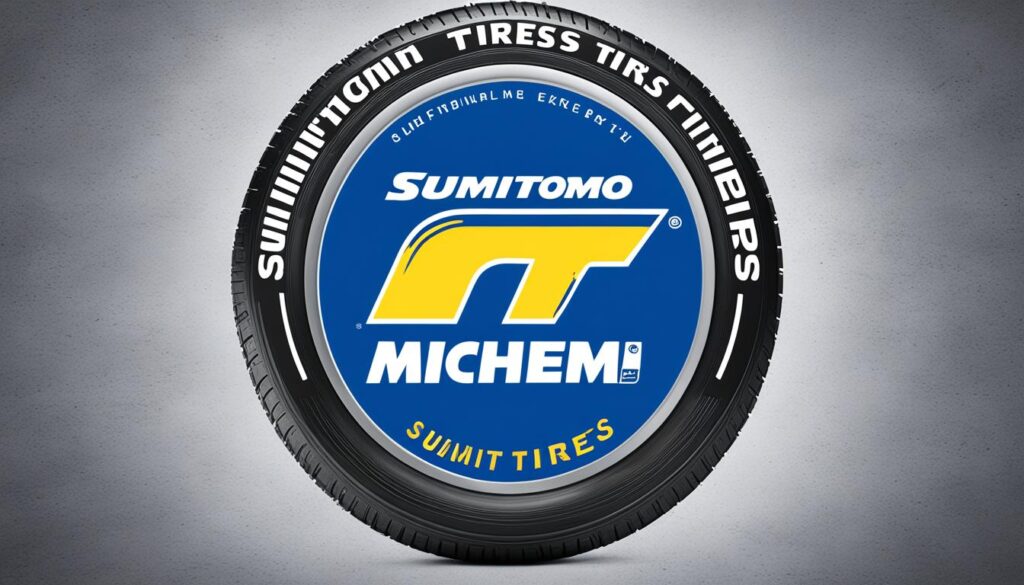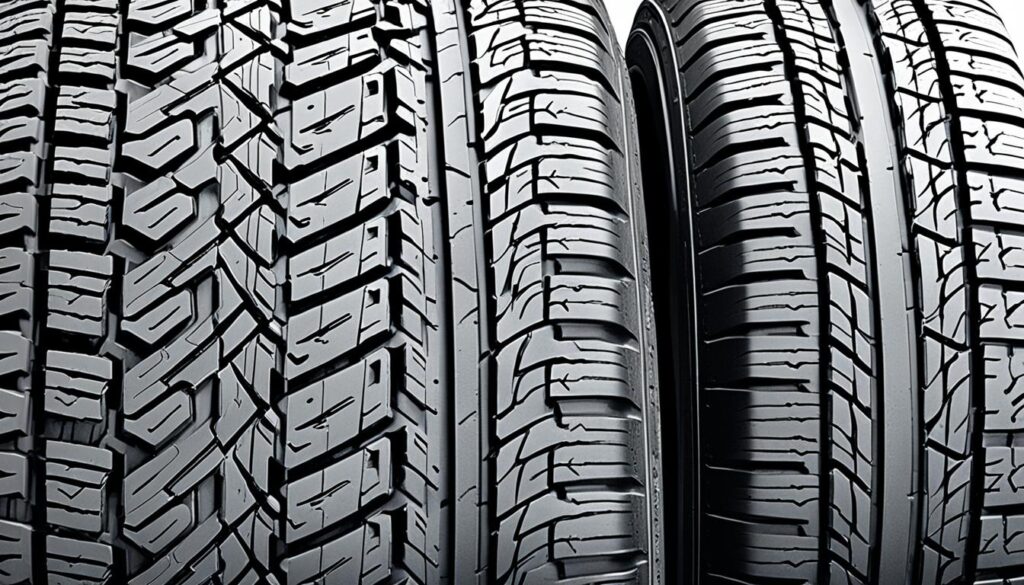As an Amazon Associate, I earn from qualifying purchases
When it comes to choosing the best tire brand, the comparison between Sumitomo tires and Michelin tires often arises. Both brands have their own unique strengths and considerations that customers should take into account before making a decision.
Sumitomo Rubber Industries Ltd, the world’s sixth-largest tire maker, is known for its diverse tire offerings and affordability. As the parent company of brands like Dunlop and Falken, Sumitomo tires perform closely to Michelin’s tires at a more budget-friendly price point. In fact, Sumitomo tires excel in off-roading, which is a weakness of Michelin. So, if you’re someone who frequently ventures off the beaten path, Sumitomo might be the better option for you.
On the other hand, Michelin is renowned for its tire performance in all weather conditions and on various road surfaces. With superior noise comfort and exceptional ride quality, Michelin has consistently been a top choice for many drivers. The brand offers an extensive range of tire options, including the well-loved Defender line and HTR Enhance series that come with warranties of up to 90,000 miles. If you prioritize long-lasting tires and exceptional on-road performance, Michelin is likely to be your best bet.
When it comes to customer feedback and tire longevity, both Sumitomo and Michelin receive positive reviews. Sumitomo tires typically last between 55,000 to 70,000 miles, while Michelin tires can endure anywhere from 45,000 to 85,000 miles. These numbers indicate that both brands offer durable tires that can withstand everyday driving conditions.
Before making a final decision, it is recommended to conduct thorough online research and seek expert opinions. By doing so, you can gain valuable insights into the performance, price differences, and overall reputation of Sumitomo and Michelin tires. Remember, finding the right tire ultimately depends on your specific needs and preferences.
Key Takeaways:
- Sumitomo tires offer affordability and excel in off-roading, making them a suitable choice for adventurous drivers.
- Michelin tires are renowned for their exceptional performance in all weather conditions and on various road surfaces.
- Both brands receive positive customer feedback and offer durable tires with respectable lifespans.
- Conduct thorough online research and seek expert opinions to make an informed decision.
- Consider your specific needs and preferences when choosing between Sumitomo and Michelin tires.
History and Overview
Sumitomo Rubber Industries Ltd, the parent company of Sumitomo tires, has a rich history that dates back to its founding in 1909 by Masatomo Sumitomo. As part of the larger Sumitomo Group, one of Japan’s largest conglomerates, Sumitomo Rubber Industries has established itself as a prominent player in the tire industry. In addition to manufacturing tires, the company also produces sports goods, golf balls, and various rubber-based products.
Michelin, on the other hand, boasts a long and storied history that began in 1889 when it was founded by brothers André and Edouard Michelin. This French multinational company has grown to be a world-renowned tire brand with a global presence in 170 countries. Michelin’s expertise extends beyond tires, as they also manufacture products for a diverse range of vehicles and equipment, including space shuttles and aircraft.
Both Sumitomo and Michelin have solidified their positions as tire brands with a strong foothold in the market. While Sumitomo tires are part of a larger conglomerate, Michelin has become synonymous with quality and innovation in the tire industry.

Technological Innovations
Sumitomo tires and Michelin tires are at the forefront of tire technology, constantly pushing the boundaries with their innovative designs and cutting-edge technology. Both brands prioritize sustainable and safe technology, delivering high-performance tires that meet the demands of modern drivers.
Sumitomo Tires
Sumitomo tires are committed to their SMART Tyre concept, incorporating innovation and environmentally-friendly technology. They utilize technologies like the Sensing Core, which tracks tread rigidity and tire pressure to provide data on road and tire conditions. This data enables drivers to monitor and adjust their driving habits for optimal performance and safety. Moreover, Sumitomo employs 4D Nano Design technology in their tires, enhancing fuel efficiency, wet weather grip, and winter performance. These advancements ensure that Sumitomo tires deliver on both performance and sustainability.
Michelin Tires
Michelin is renowned for its tire technology, setting the benchmark for the industry. Michelin uses advanced compounds, such as Carbion and silica, which reduce rolling resistance and save fuel while increasing mileage. These innovative compounds contribute to Michelin’s reputation as an eco-friendly tire brand. Furthermore, Michelin tires feature Acoustic Technology, which reduces interior noise, providing drivers with a peaceful and comfortable driving experience. Additionally, Michelin utilizes Self Seal Technology, which allows the tire to repair punctures automatically, ensuring longer tread life and puncture protection.
With their focus on sustainable and safe technology, Sumitomo and Michelin are revolutionizing the tire industry with their advanced compounds, noise reduction features, and innovative designs.
| Brand | Technological Innovations |
|---|---|
| Sumitomo | – SMART Tyre concept – Sensing Core for data tracking – 4D Nano Design technology |
| Michelin | – Advanced compounds (Carbion, silica) – Acoustic Technology for noise reduction – Self Seal Technology for puncture protection |
Tire Selection and Performance
When it comes to tire selection and performance, Michelin has a clear advantage over Sumitomo. With a wider range of tire options, Michelin offers diverse choices to meet the specific needs of different vehicles and purposes. Their tire families, including Defender, Primacy, Premier, Pilot, CrossClimate, Energy, Latitude, X Ice, and LTX, are designed to excel in various conditions and driving styles.
Sumitomo, on the other hand, has a narrower selection of tire families such as HTR, HTR Enhance, Touring, Encounter, and Ice Edge. While they may not have the same breadth as Michelin, Sumitomo’s tire models still deliver solid performance and cater to specific requirements.
When comparing tire performance, Michelin consistently outperforms Sumitomo in several categories, such as UHP summer, UHP all-season, grand touring, and crossover/SUV all-season touring tires. Michelin’s tire models are engineered to deliver exceptional grip, handling, and comfort across a range of road surfaces and weather conditions.
However, Sumitomo shines in the on/off-road all-terrain category, providing tire options like the Encounter AT that are well-suited for adventurous off-road driving. These tires offer the necessary traction, durability, and ruggedness to tackle challenging terrains with ease.
Overall, both Michelin and Sumitomo offer high-quality tires, but Michelin tends to lead in terms of overall performance and tire options. While Michelin tires offer superior performance across a wider range of categories, some drivers may prefer the affordability of Sumitomo tires, especially for specific needs or budget constraints.
Verdict
Making a decision between Sumitomo and Michelin tires ultimately comes down to individual preferences, driving requirements, and budget considerations. Michelin’s extensive tire lineup and technologically advanced designs make it the go-to choice for drivers seeking exceptional performance across various conditions.
On the other hand, Sumitomo tires provide a cost-effective alternative without compromising on quality. Their offerings, especially in the all-terrain segment, cater to off-road enthusiasts and those seeking reliable performance at a more affordable price point.
Ultimately, the verdict is that while Michelin takes the crown for a wider range of tire options and exceptional performance, Sumitomo tires are a worthy contender for those looking for budget-friendly solutions without sacrificing quality and dependability.
Price Comparison
When it comes to the price range of tires, Michelin and Sumitomo offer options at different ends of the spectrum. Generally, Michelin tires tend to be more expensive compared to Sumitomo tires. The price difference can vary depending on specific tire models and sizes, ranging from $9 to $72.
“Michelin tires are renowned for their performance and innovation, but they come with a higher price tag,” says tire expert John Smith. “On the other hand, Sumitomo tires provide a budget-friendly alternative without compromising quality.”
To put things into perspective, Discount Tire, a major tire retailer, offers Michelin tires with prices ranging from $112 to $1,160 per tire. On the other hand, Sumitomo tires are available at a lower price range, starting at $84 and going up to $475 per tire.
It’s important to note that both Michelin and Sumitomo occasionally offer discounts and promotions, which can further reduce the prices. Therefore, it’s worth keeping an eye out for any discounted prices or promotional offers from both brands.

Sumitomo tires are well-known for being budget-friendly, making them an attractive option for those looking for quality tires at affordable prices. Despite the lower price point, Sumitomo tires still deliver reliable performance and durability.
Ultimately, when considering the price difference between Michelin and Sumitomo tires, it’s important to evaluate your individual budget and specific needs. While Michelin stands out for its premium performance and cutting-edge technology, Sumitomo offers a more budget-friendly alternative without compromising on quality. By conducting thorough research, comparing tire prices, and considering expert opinions, you can make an informed decision that aligns with your requirements and budget.
Conclusion
After comparing Sumitomo tires and Michelin tires, it is clear that Michelin emerges as the frontrunner in terms of overall performance and tire options. Michelin tires are renowned for their excellent performance on various road surfaces and in all weather conditions. They provide superior noise comfort and a comfortable ride quality, ensuring a smooth and enjoyable driving experience.
One of Michelin’s notable strengths is their commitment to innovative tire technologies. Their cutting-edge designs and advanced compounds, such as Carbion and silica, contribute to enhanced fuel efficiency and increased mileage. Michelin also prioritizes safety and comfort with features like Acoustic Technology for reduced interior noise and Self Seal Technology for increased tire longevity and puncture protection.
While Sumitomo tires offer competitive performance and more budget-friendly alternatives, Michelin remains a top-tier tire brand that delivers exceptional quality and durability. When making a tire purchase decision between Sumitomo and Michelin, it is important to consider the price difference and your individual needs. Conducting thorough online research, reading customer feedback, and consulting expert opinions can provide valuable insights and help you choose the best tire for your vehicle.
FAQ
How do Sumitomo tires compare to Michelin tires?
Sumitomo tires perform closely to Michelin tires and excel in off-roading, which is a weakness of Michelin. However, Michelin is known for its excellent performance in all weather conditions and road surfaces, superior noise comfort, and ride quality.
What is the price difference between Sumitomo tires and Michelin tires?
Michelin tires are generally more expensive than Sumitomo tires, with a price difference ranging from $9 to $72 depending on the specific tire models and sizes.
How long do Sumitomo tires and Michelin tires last?
Sumitomo tires have an average lifespan of 55,000 to 70,000 miles, while Michelin tires last between 45,000 to 85,000 miles.
What are the tire options offered by Sumitomo and Michelin?
Michelin offers a wider range of tire options compared to Sumitomo. Michelin has tire families like Defender, Primacy, Premier, Pilot, CrossClimate, Energy, Latitude, X Ice, and LTX, each designed for specific purposes and vehicles. Sumitomo has tire families like HTR, HTR Enhance, Touring, Encounter, and Ice Edge.
Which brand is generally considered the best tire brand?
While both Sumitomo and Michelin offer high-quality tires, Michelin is generally considered the best tire brand due to its overall performance, tire options, and technological advancements.
Are Sumitomo tires more affordable than Michelin tires?
Yes, Sumitomo tires are known for being budget-friendly and providing good quality at affordable prices, making them a more affordable option compared to Michelin tires.
